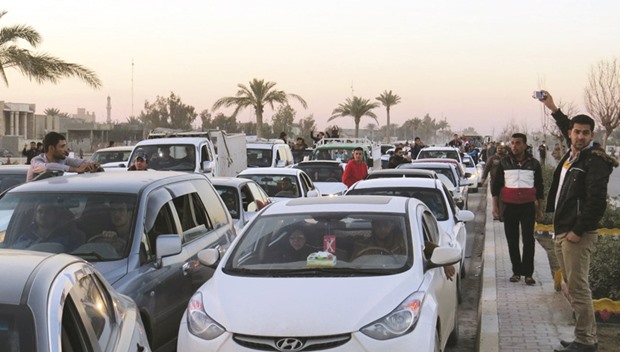Hundreds of fighters from local Sunni tribes were deployed yesterday in some areas of the Iraqi city of Ramadi retaken from the Islamic State group, security officials said.
“Five hundred members of the tribes from the Hashed arrived in northern Ramadi to participate in operations there and hold the liberated areas,” said Major General Ismail Mahalawi, who heads Anbar operations command.
The Hashed al-Shaabi (Popular Mobilisation) is an umbrella group of mostly Tehran-backed Shia militias that have played a key role in retaking land from IS.
However, Sunni fighters from Anbar tribes opposed to the militants also officially belong to the group, which is nominally under Prime Minister Haider al-Abadi’s command.
“Five units of tribal forces arrived today and hold the areas of Jaraishi, Zawiyah and Albu Faraj north of Ramadi,” said their leader, Tareq Yusef al-Asal.
They had been trained on Habbaniyah base and armed by the defence ministry, he added.
The premier visited the Anbar capital yesterday, a day after the elite counter-terrorism service raised the Iraqi flag above the city’s large government complex.
The provincial headquarters had been the epicentre of the fighting since Iraqi forces punched through IS defences a week ago to cap a months-long operation to retake Ramadi.
Abadi congratulated the security forces, who were still sweeping streets and buildings for roadside bombs, booby traps and holed up militants.
Security sources said Abadi had arrived by helicopter at the Anbar University complex and would meet with commanders from Iraq’s army and counter-terrorism forces.
Abadi later announced the visit to the Anbar provincial capital himself on Twitter and said he was inspecting troops at the main government complex there. He separately declared tomorrow a national holiday in celebration.
The army’s apparent capture of Ramadi, in the Euphrates River valley west of Baghdad, marks a milestone for the forces, which crumbled when the militants seized a third of Iraq in June 2014.
In previous battles, Iraq’s armed forces had operated mainly in a supporting role beside the Shia militias.
Hisham al-Hashimi, a Baghdad-based analyst who has worked with the Iraqi government, said the retaking of Ramadi suggested Abadi’s strategy of heavy US air support while sidelining the militias could be effective.
“Ramadi is an example that the regular army wishes to promote for upcoming battles of liberation,” said Hashimi.
Ramadi is the only city to fall under Islamic State control since Abadi took office in September 2014, after the militants’ lightning advance across the north and west of the country.
“He is excited about this victory, because he managed to remove this blot from his historical record as commander-in-chief of the armed forces,” said Hashimi.
Abadi’s Shia-led government has said for months it would prove the rebuilt capability of the army by reversing militant gains in Anbar, a largely desert province stretching from Baghdad’s outskirts to the borders of Syria, Saudi Arabia and Jordan.
As part of his security reforms, Abadi last year scrapped 50,000 “ghost soldiers” - army members who don’t actually exist but whose salaries are collected - and changed top security chiefs in a bid to improve performance. But he has faced resistance to dismantling a patronage system and rooting out incompetence in the security apparatus and other state organs.

Iraqis drive their vehicles early yesterday through Ramadi after Iraqi forces recaptured the city from the Islamic State.
